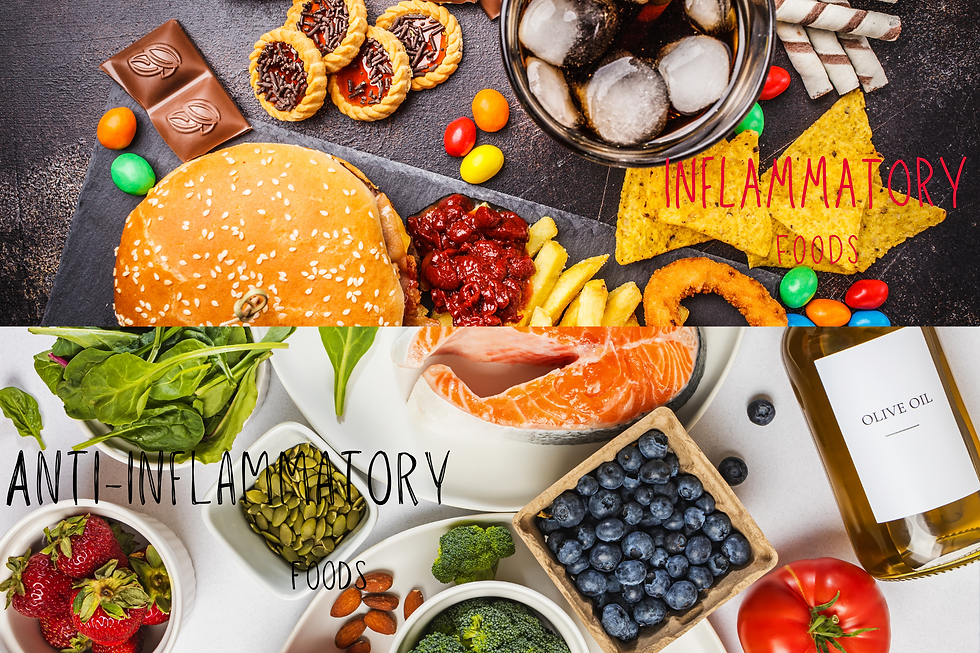Inflammation: How Food Choices Affect Your Body
- Kristin York, MSN, APRN, FNP-C
- May 28, 2024
- 3 min read
Ever wake up feeling like your body is aching for no apparent reason? Is your stomach a mess, and you cannot understand why? You are not alone. Many people, just like you, visit their doctors with complaints of joint pain, muscle aches, fatigue, diarrhea, and other symptoms, only to be told all their tests are normal.
First, you will want to learn what inflammation is. Then, you can look at what you eat to find out if it could contribute to your pain and possibly other symptoms of inflammation.
What is inflammation?
Your body creates inflammation to protect itself from infection, injury, and disease. There are three main types of inflammation: acute, subacute, and chronic.
Acute inflammation - This type is usually short, lasts less than two weeks, and is more severe while it works to restore your body to how it was before you were sick or hurt. You might have pain, redness, swelling, or loss of function.
Subacute inflammation – If symptoms have not improved after the acute phase, the next 2 – 6 weeks of inflammation are referred to as subacute.
Chronic inflammation – While typically less severe, this type lasts beyond six weeks. Many major diseases have been linked to chronic inflammation, such as arthritis, diabetes, heart disease, and cancer. Environmental factors, obesity, smoking, stress, and unhealthy food can worsen inflammation.
Symptoms might include:
Worsening fatigue.
Sleeping problems.
Joint or muscle pain.
Stomach issues, such as diarrhea, constipation, or heartburn.
Mental health conditions, such as anxiety or depression.
Do any of these things sound familiar to you? It is always recommended that you see your doctor to identify other causes, but you can also start by looking at your food and changing your diet.
Inflammatory Foods
Many common foods increase the risk of chronic inflammation. You can generally spot these foods by reading the label. They will have many ingredients, can last a long time on the shelf in a can or box, and are even some ready-to-eat meals.
Let’s find out if your food is part of the problem. Here is a list of the most common inflammatory foods:
Red meat, like burgers and steaks.
Processed meat, such as lunchmeat, hot dogs, bacon, and sausage
White flour products, like bread and pasta
Fried foods
Sugary drinks and sodas
Foods that are highly processed and full of sugar, including cookies, some cereals, and dressings.
High trans-fat foods include margarine, lard, refrigerated dough, and some coffee creamers.
Alcohol
Consuming these too often can cause your body to react, creating more inflammation. It is best to cut back or avoid them.
Anti-inflammatory Foods
Sometimes, just by changing your diet and reducing the number of sugars, processed foods, and trans fats that you eat, you might start to feel better. You may also consider adding the following foods to your diet. These foods are known to help reduce inflammation.
Fruits, particularly berries and cherries
Fatty fish, like salmon and tuna
Broccoli
Avocados
Mushrooms
Tomatoes
Leafy greens, such as spinach, kale, and collards
Nuts and seeds
Olive oil
Overall, a healthy diet of minimally processed foods is the goal to reduce inflammation. Many experts recommend looking at the Mediterranean diet as an anti-inflammatory eating plan because it is high in fruits, vegetables, nuts, whole grains, fish, and healthy oils.
Summary
Inflammation is the body’s response to infection, injury, or disease. It is also linked to environmental factors, stress, and unhealthy lifestyles, including your diet. Many foods can cause more inflammation and should be limited or avoided. Choosing foods known for reducing inflammation should be the biggest part of your healthy eating plan.
Sources
Anti-inflammatory Diet. John Hopkins Medicine. https://www.hopkinsmedicine.org/health/wellness-and-prevention/anti-inflammatory-diet
Low-Grade Inflammation and Ultra-Processed Foods Consumption: A Review. NIH: National Library of Medicine. https://www.ncbi.nlm.nih.gov/pmc/articles/PMC10058108/
Foods that Fight Inflammation. Harvard Health Publishing: Harvard Medical School. https://www.health.harvard.edu/staying-healthy/foods-that-fight-inflammation
What to Know About Inflammation. Healthline. https://www.healthline.com/health/inflammation
Chronic inflammation: What it is, why it’s bad, and how you can reduce it. Mayo Clinic Press. https://mcpress.mayoclinic.org/dairy-health/chronic-inflammation-what-it-is-why-its-bad-and-how-you-can-reduce-it/
The best ways to identify processed foods. Harvard Health Publishing: Harvard Medical School. https://www.health.harvard.edu/staying-healthy/the-best-ways-to-identify-processed-foods
Assessed and Endorsed by the MedReport Medical Review Board







